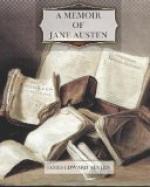’Mr. C.’s opinion is gone down in my list; but as my paper relates only to “Mansfield Park,” I may fortunately excuse myself from entering Mr. D’s. I will redeem my credit with him by writing a close imitation of “Self-Control,” as soon as I can. I will improve upon it. My heroine shall not only be wafted down an American river in a boat by herself. She shall cross the Atlantic in the same way; and never stop till she reaches Gravesend.’
’We have got “Rosanne” in our Society, and find it much as you describe it; very good and clever, but tedious. Mrs. Hawkins’ great excellence is on serious subjects. There are some very delightful conversations and reflections on religion: but on lighter topics I think she falls into many absurdities; and, as to love, her heroine has very comical feelings. There are a thousand improbabilities in the story. Do you remember the two Miss Ormsdens introduced just at last? Very flat and unnatural. Madelle. Cossart is rather my passion.’
Two notices of her works appeared in the ‘Quarterly Review.’ One in October 1815, and another, more than three years after her death, in January 1821. The latter article is known to have been from the pen of Whately, afterwards Archbishop of Dublin. {140} They differ much from each other in the degree of praise which they award, and I think also it may be said, in the ability with which they are written. The first bestows some approval, but the other expresses the warmest admiration. One can scarcely be satisfied with the critical acumen of the former writer, who, in treating of ‘Sense and Sensibility,’ takes no notice whatever of the vigour with which many of the characters are drawn, but declares that ’the interest and merit of the piece depends altogether upon the behaviour of the elder sister!’ Nor is he fair when, in ’Pride and Prejudice,’ he represents Elizabeth’s change of sentiments towards Darcy as caused by the sight of his house and grounds. But the chief discrepancy between the two reviewers is to be found in their appreciation of the commonplace and silly characters to be found in these novels. On this point the difference almost amounts to a contradiction, such as one sometimes sees drawn up in parallel columns, when it is desired to convict some writer or some statesman of inconsistency. The Reviewer, in 1815, says: ’The faults of these works arise from the minute detail which the author’s plan comprehends. Characters of folly or simplicity, such as those of old Woodhouse and Miss Bates, are ridiculous when first presented, but if too often brought forward, or too long dwelt on, their prosing is apt to become as tiresome in fiction as in real society.’ The Reviewer, in 1821, on the contrary, singles out the fools as especial instances of the writer’s abilities, and declares that in this respect she shows a regard to character hardly exceeded by Shakspeare himself. These are his




